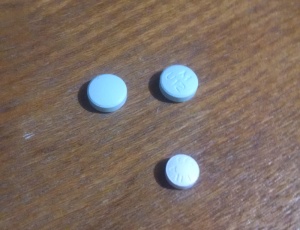I’m in a dysthymia support group on Facebook. It’s been an interesting, educational experience that I’ll write about some other time. The group has been of particular interest lately, however, as the group has been arguing over the proper role of religion in such a group. A friend of mine in an illness support group had a similar experience.
The argument was spurred by a couple of posts and comments. First, a participant asked, how can a benevolent god leave me to suffer with this terrible affliction? This is a mild version of the problem of evil, considered one of strongest arguments against the existence of an omnipotent, omniscient, omni-benevolent being. It essentially boils down to this: how could such a being allow the clear evils that occur in our world to happen? Proponents of theism do not have a good argument to defend against the problem of evil other than “god has a plan” or “we’re incapable of understanding such a being’s motivations”. These responses typically are dismissed out-of-hand by most philosophers as the non-responses that they are.
(Did I mention that I’m a recovering philosophy major? If you didn’t know, then you do now!)
The second event that caused the religion flare-up on the dysthymia group was a person saying she didn’t want people to pray for her when someone said as such in response to one of her posts. This woman had poor experiences with religion in her youth, and prayer made her uncomfortable. Others perceived this as an attack on their religion and their well-wishes.
I have a confession to make. Well, okay, I already made it in my very first post: I’m an atheist. Or, more accurately, I’m a humanist. Like many humanists, I dislike the term “atheism” because it defines my belief system in terms of another, more “dominant” set of beliefs, rather than accepting it as a system unto itself. By proclaiming a lack of belief in a supernatural being(s), I am not making an extraordinary claim about the world. Quite to the contrary, those who believe in a supernatural being(s) are making such a claim, and extraordinary claims require extraordinary evidence. Such evidence is lacking (See how easily the cosmological, ontological, and teleological arguments for the existence of a supreme being(s) are dispensed). I also dislike “atheist” because there’s still a significant amount of bias against humanists.
Many people who have chronic or deadly illnesses find comfort in religion. People use it as a source of strength and hope. Step two of Alcoholics Anonymous is “came to believe that a Power greater than ourselves could restore us to sanity”. It’s hard for many to imagine having hope in absence of faith. Otherwise, the world just seems random and cruel. And just as those people in the dysthymia support group think, religion gives people the power to carry forward, confident that things will get better.
Such beliefs seem unnecessary and often counterproductive to me. Nonetheless, I don’t begrudge people feeling comfort in religion, as long as they’re not forcing it upon others, of course.People should find solace where they can. The thought of suffering through an illness such as dysthymia minus the help of the divine likely seems frightening to some, but I receive my comfort from science, reason, interconnection, and our common humanity.
So religion doesn’t help me to live life with dysthymia. What does help me is the thought of how incredibly amazing it is that we’re here. Us. Individually. The specific people that we are. Think about it: in order for the multiverse to have produced you, it took a series of events and choices spanning billions of years. Billions with a “B”. Any slight difference anywhere along that line of happenings could have produced someone or something completely different. But instead, you are the culmination of the multiverse’s work. I think that’s pretty damn amazing, and inspiring. How can I not be spurred to make the world a better place when it took so long for it to make me the person who I am, cosmically and just within my lifetime? Richard Dawkins says it best:
“We are going to die, and that makes us the lucky ones. Most people are never going to die because they are never going to be born. The potential people who could have been here in my place but who will in fact never see the light of day outnumber the sand grains of Arabia. Certainly those unborn ghosts include greater poets than Keats, scientists greater than Newton. We know this because the set of possible people allowed by our DNA so massively exceeds the set of actual people. In the teeth of these stupefying odds it is you and I, in our ordinariness, that are here.We privileged few, who won the lottery of birth against all odds, how dare we whine at our inevitable return to that prior state from which the vast majority have never stirred?” (From Unweaving the Rainbow: Science, Delusion and the Appetite for Wonder)
It’s hard to see such perspective when I’m in the throes of depression (Which, by the way, might very well be an evolutionary adaptation. More coolness about the world!). Then again, as evidenced by the interlocutor in the dysthymia support group, neither necessarily would a religious perspective. But in my stronger times, I find the enormity of the world an inspiration, even if there may be bugger for intelligent life here on earth.

